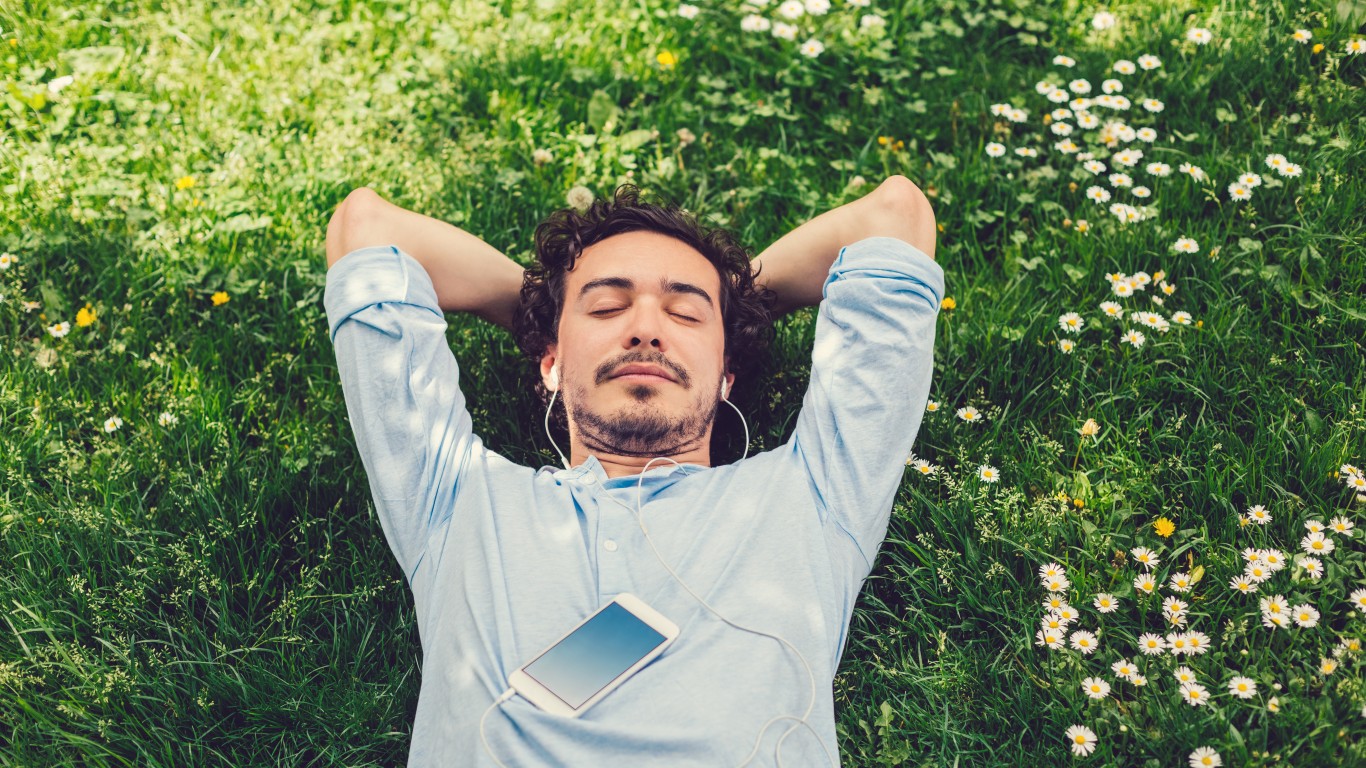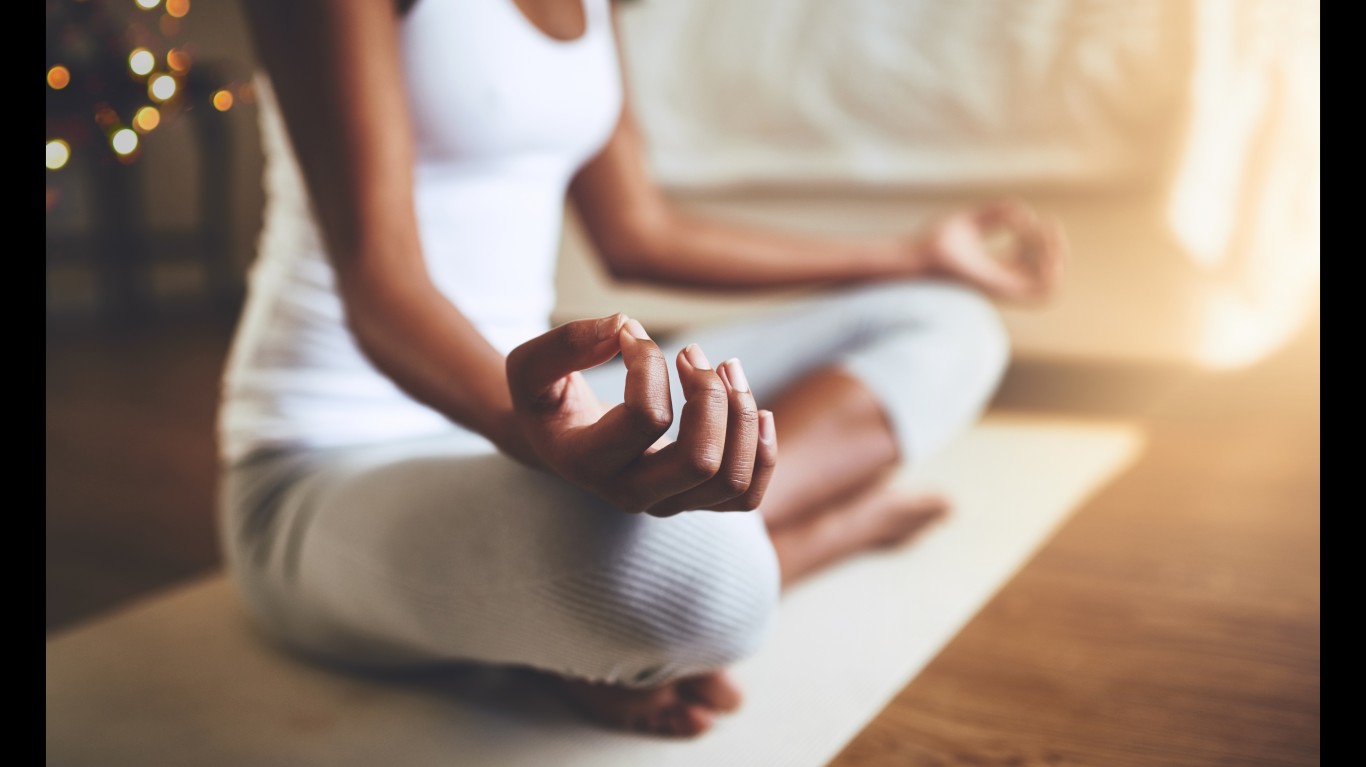Special Report
20 Ways to Live a Simpler, Happier Life in 2020

Published:
Last Updated:

Happiness is one of the most positive emotions people can experience. That joyful feeling is linked to living longer, working hard, performing basic daily activities better as they age, and having stronger immune systems.
Joy is hard to define as it varies from one person to another. Getting to a point where you’re genuinely happy may sound easier said than done. Some factors that affect cheerfulness may be out of your control, but there are many actions you can take to be in a better mood.
24/7 Tempo reviewed dozens of research reviews and articles written by psychologists to compile a list of 20 ways you can amp up your own good feelings.
While the emotion may be difficult to quantify, some general factors that tend to lead to better overall well-being are easier to measure, such as social, financial, and health status — these are the happiest states in America.
Click here for 20 ways to live a simpler, happier life

1. Look at the glass half full
Fight negative thoughts with positive ones. Try to always look at the bright side. By following negative thoughts with positives ones, you are training your brain to create relaxation, increase positive emotions, and build happiness. A study by the University of Wisconsin-Madison found that simply perceiving stress as a good thing can reduce its negative effects. Data from the 29,000 study participants showed that those who took stress in stride were healthier.
[in-text-ad]

2. Make a big deal of small wins
Progress has an enormous power on people’s happiness levels, according to research. Studies of psychological experiences and the performance of people working inside organizations showed that they were happiest and most productive — and thus most motivated — when they had made some progress in the work they were doing. The “worst days” were when they had a setback.

3. Practice mindfulness
Mindfulness is about paying attention to the present and being open to whatever is currently happening around you. Some research has shown that practicing mindfulness increases happiness because people deliberately slow down to focus on thoughts and emotions. Another part of practicing mindfulness is acceptance. It makes people happier because it’s the opposite of judging and shifts the mindset away from thinking about what we don’t have.

4. Embrace imperfection
Imperfection allows people to embrace who they are and embrace the possibility of improving. You can see imperfections as mistakes or as chances to be creative or special qualities. Some experts even say that the pursuit of perfection may actually be the biggest obstacle to being happy. People become consumed with the fear of failure, leaving no room for positive emotions.
[in-text-ad-2]

5. Spend money to save time
Money can’t buy happiness — or can it? Money may boost happiness if it ends up saving you time, according to a study published in the Proceedings of the National Academy of Sciences. Instead of working on a task you don’t like, pay someone to do it for you. Researchers gave 6,000 people in four countries $40 for two weeks. They were asked to buy themselves something material and then to buy themselves time by hiring other people to do jobs they dislike, such as cleaning the house. People reported being happier when they used the money to save time.
6. Travel close and far
In addition to time, money can buy experiences that make you happy. One such experience is travel — anywhere. A review of psychological studies found that experiences make us happy because they are a bigger part of ourselves than any material objects. People adapt to physical things, which, as time goes by, bring decreasing amounts of happiness. Travel creates (usually) happy memories and breaks our routine.
[in-text-ad]

7. Be grateful
Gratitude is strongly associated with greater happiness, according to positive psychology research. Being thankful for what one has and receives helps people feel more positive emotions, enjoy and appreciate nice experiences, deal with adversity, and build strong relationships. Gratitude helps people avoid focusing on what they think may make them happier but don’t currently have.
8. Volunteer
A lot of research has linked volunteering with better mental health. One theory as to why is that volunteering creates opportunities for social interactions. Giving back was found to reduce stress in people, increase their self-confidence, enable a support system, and provide a new sense of purpose.

9. Listen to music, any music
It’s probably no surprise that listening to happy, upbeat music can lift anyone’s spirits. A study conducted at McGill University in Canada has found that the brain releases dopamine, the so-called “feel-good” hormone, in response to music, regardless of the listening environment. Listening to sad music will do the trick as well. An analysis of several surveys found that people enjoyed listening to sad music as much as to happy music.
[in-text-ad-2]

10. Stop comparing
Social media has been around for long enough to show that it may contribute to depression, anxiety, and lower self-esteem. The longer you are scrolling through social media feeds the higher the chance you are going to get sucked into a comparison trap, thinking your life probably pales in comparison to everyone else’s.

11. Be around happy people
Happiness may be contagious. So spend time with people who are positive and make you happy. Research by experts from Harvard Medical School and the University of California San Diego found that those who were around cheerful people were happier themselves and were in a better mood.
[in-text-ad]

12. Go to the park every day
Achieving happiness can be as easy as a walk in the park…literally. So next time you need a little boost in mood, spend time outdoors. It helps lower blood pressure and heart rate. As little as 20 minutes will do the trick. Some research has even found that green spaces are linked to a lower risk of developing a psychiatric disorder.

13. Exercise for 10 minutes
Most people have heard of “runners’ high.” But it applies not only to runners, but to all people who are engaged in a physical activity. During exercise, the body releases endorphins, which trigger a positive, happy feeling, just like morphine. Some research suggests that even just 10 minutes of exercise is enough to induce feelings of happiness. People who exercise about once a week for 10 minutes a day are more cheerful than those who never exercise. Physical activity can protect against depression regardless of age and geographical region, according to a study published in the American Journal of Psychiatry.

14. Take naps
Some people get really cranky when they are tired and haven’t slept. Naps are important not only because they can boost mood but also because they play a role in how people process emotions. People who don’t take naps tend to focus more on negative emotions and those who have napped during the day tend to focus more on the positive, according to some research. People who have gotten some REM sleep, the restful stage of sleep, are more likely to be desensitized to negative emotions.
[in-text-ad-2]

15. Simply smile
You can trick yourself into being happier simply by smiling. Even if it feels like there is no reason to smile, think of something nice and smile anyway. A study by a Michigan State University professor examined customer-service workers. Those who fake smile throughout the day worsen their mood while those who smile after thinking of something positive like a vacation improve their mood.

16. Plan a vacation
Looking forward to a vacation is almost as powerful as being one. Prior to taking time off, vacationers are much happier, according to a study by Erasmus University in Rotterdam and NHTV Breda University of Applied Sciences, both in the Netherlands. Those planning a vacation may be happier than those who don’t go on one because they are anticipating a break from work and having fun.
[in-text-ad]

17. Meditate
Meditation has been associated for a long time with physiological benefits such as lowering blood pressure and helping to ease migraine headaches. Some studies have found that meditation has certain cognitive benefits as well, such as preventing brain cells from dying, helping people focus, and dealing with stress. Meditation helps reset the happiness point in the brain, rewiring major parts of it.

18. Just let go
Don’t hold grudges. That sort of anger and resentment only deepens over time and psychologists worry it’s an unhealthy response to injustice. It can eventually lead to anxiety, irritability, and even depression. Psychologists recommend forgiveness because it’s a deliberate decision to release any feelings of resentment toward someone, a difficult but much-needed step to achieve happiness.

19. Load up on the right foods
We often identify food with emotions: comfort food, guilty pleasure. Food affects not just the physical structure of the brain, but our mood too, because most serotonin, known as the “happy” hormone, is produced in the gastrointestinal tract. Research has shown that people whose diets are high in vegetables, fruits, unprocessed grains, and seafood, and low in processed foods, refined sugars, meat, and dairy, are at lower risk of depression.
[in-text-ad-2]

20. Dress in bright, warm colors
People usually put a lot of thought into what colors they are going to paint the walls in their homes. Colors evoke feelings, and bright, warm colors in particular — think green and yellow — make people feel happier. That’s according to a study conducted by the Vrije Universiteit in Amsterdam, Netherlands. Blue tends to help people calm down; red and violet give them energy.
If you’re one of the over 4 Million Americans set to retire this year, you may want to pay attention.
Finding a financial advisor who puts your interest first can be the difference between a rich retirement and barely getting by, and today it’s easier than ever. SmartAsset’s free tool matches you with up to three fiduciary financial advisors that serve your area in minutes. Each advisor has been carefully vetted, and must act in your best interests. Start your search now.
Don’t waste another minute; get started right here and help your retirement dreams become a retirement reality.
Thank you for reading! Have some feedback for us?
Contact the 24/7 Wall St. editorial team.